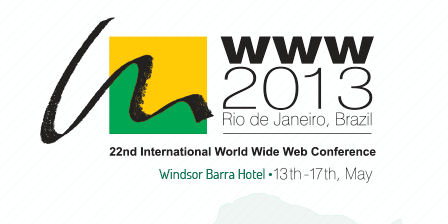Cutting-edge research at the World Wide Web Conference in Rio De Janiero
The World Wide Web conference attracts researchers and industry experts alike, pooling them in an environment where ideas for the future direction of the WWW can emerge and prosper.
This year, Rio de Janeiro, Brazil, a lively city where steep hills and beautiful beaches form a breathtaking landscape, played host to the international gathering.
A plethora of industrial demonstrations completed the research tracks, showing cutting-edge research and its potential business value. The conference did not cheap out on luminaries- Sir Tim Berners-Lee, the inventor of the WWW, chaired student tracks and joined panel discussions.
Luis von Ahn, visionary entrepreneur and scientist, introduced the audience to his ideas of double-using data from his applications such as Duolingo, a free language-learning software, which outperforms established, commercial tools, and is also a professional translator into the bargain.
Dr. Miguel Nicolelis, pioneer in neuroscience, gave a stunning presentation showing the current status of brain-machine interfaces. Taking the audience on a journey resembling a trip on star ship Enterprise, he ended up with visualizing his idea of having a physically disabled person getting out of the wheel chair and do the kick-off at the World Cup 2014 in Brazil - using an exo-skeleton connected to the brain of the disabled person (www.nicolelislab.net)
Stefan Gindl, researcher and lecturer at MODUL University Vienna, presented his on-going work in the field of opinion mining with focus on opinion target extraction. Stefan presented at MABSDA, the workshop on "Multidisciplinary Approaches to Big Social Data Analysis" and showed the effort of his team to tackle the problem of identifying the target of an opinion in a natural language text.
This question has significant business value - it allows software tools to automatically derive large-scale opinion data from web texts, relieving companies from the burden of doing personal interviews or questionnaires to access the crowd's opinion. Above that, it's also one step further towards the understanding of how the human brain processes language, derives useful information, and interacts with the world.





